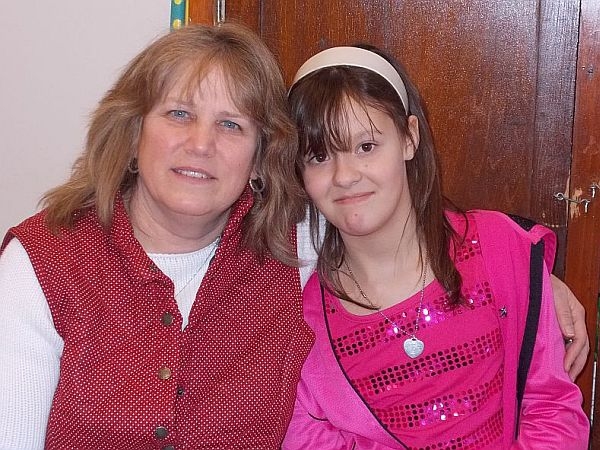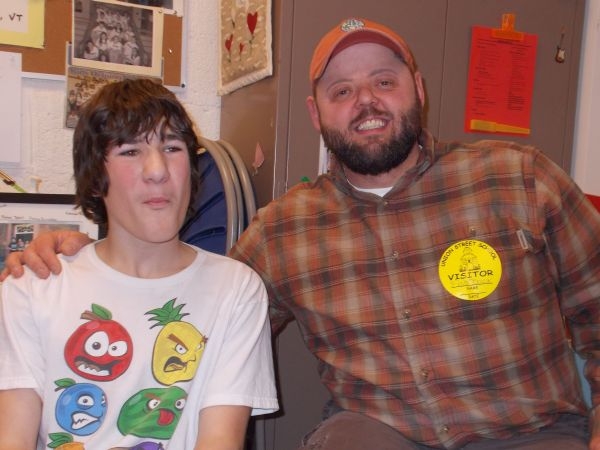
January is National Mentoring Month. A mentor is defined as a wise and trusted counselor or guide. In a growing number of schools and community programs, mentors are volunteers. They’re reliable, caring adults who share their time and attention in a one-on-one friendship with a child.
Mentors working through "Let’s Do Lunch" a lunch-time program in Windsor County, show up every Thursday at Springfield’s Union Street School.
On those days, nine-year-old Logan Barrett threads his way through the lunch line as usual. But he doesn’t take his tray to the table where his third grade class is eating.
He heads for a room near the guidance office, for his weekly hour-long date with his mentor Jeanice Garfield.
Logan says it’s nice to leave noisy school activities behind and spend time with a grownup.
"We play sometimes," he says. "And if Jeanice brings her tablet sometimes we look up things . I’m really interested in dinosaurs."
Today they start with a game. They sort out the plastic pieces.
"What color would you like to be kiddo?" Garfield asks.
"I’ll be red," Barrett says.
As they play, Garfield mentions that she saw an article about a boy who found some woolly mammoth bones. She doesn’t have her tablet with her today, but she has her smart phone.
She picks it up. "Let me see… recent discoveries… See here, ‘Eleven year old boy finds ice age carcass in Siberia.’"
Barrett responds with an appreciative, "Whoa!"
 A few doors down the hall, Allie Gibbons is in the health office with her mentor, school nurse Jenny Anderson. Gibbons is a lively fifth grader and aspiring pop star in a sparkly pink shirt. Anderson has been her mentor since second grade, when Gibbons had a serious illness.
A few doors down the hall, Allie Gibbons is in the health office with her mentor, school nurse Jenny Anderson. Gibbons is a lively fifth grader and aspiring pop star in a sparkly pink shirt. Anderson has been her mentor since second grade, when Gibbons had a serious illness.
"I would always come down to the nurse’s office everyday to say hi," Gibbons recalls. "And my mom said, why not we have nurse Jenny be her mentor?"
Gibbons says Anderson is someone she can always turn to. Anderson smiles.
"Allie and I kind of reflect on her week every week," she says. "And she tells me what’s going on, at school or at her home. And sometimes we do special projects."
"So how’s your day going?" Anderson asks now.
"Good," Gibbons says.
"Weren’t you guys in the gym earlier?" her mentor asks.
Gibbons tells her they were practicing a song her class is going to sing at Town Meeting.
Anderson smiles again. "Well you like being onstage, don’t you?"
Gibbons answers emphatically, "Yes, I do!" and they share a laugh. The Anderson asks if anything else is going on that Gibbons wants to share.
"Let’s do Lunch’ is run by Windsor Country Partners. The 40-year-old agency also sponsors community-based mentoring programs which demand more time.
"Let’s do Lunch" asks volunteers to spend an hour a week with their mentees.
Sarah Carter is the program coordinator.
"We’re looking for people who have a little time on their hands and care about kids" Carter explains. "But we don’t expect them to be social workers."
She says "Let’s do Lunch" is not for children in crisis. Kids with serious problems or mental health issues have other services.
"The goal is to provide a stable, reliable trustworthy adult, " Carter says, "which research has shown really promotes a lot of resiliency, increased self esteem. We see that the kids who have mentors over a long period of time are kids that do not end up with drugs or alcohol."
The program does expect reliability. The research also shows that children whose relationships with mentors were not reliable or fizzled out, actually fare worse than kids with no mentors at all.
‘Let’s do lunch’ has twenty-five mentors in Windsor County. Carter says she’d like a hundred more, judging by requests she gets from teachers, parents and the kids themselves.
She says kids are constantly asking for mentors. "They want that one special person in their life that gives them undivided attention."
 Zach Cheney, a Union Street fifth grader, says his friends are always asking to share his weekly lunch date with his mentor Floyd Buck.
Zach Cheney, a Union Street fifth grader, says his friends are always asking to share his weekly lunch date with his mentor Floyd Buck.
"A lot of them say, ‘I wish I had a mentor like Floyd.’" Cheney says.
Floyd Buck works for a company that gives him time to meet with Zach each week. The two have been together since Zach was in kindergarten and hope to continue through high school.
Buck says families and teachers are immeasurably important in a child’s life.
But he adds, "When it’s a teacher or a parent, the kid sometimes looks as it as their job. Whereas a mentor doesn’t necessarily have to be there. part like the community is behind them too."
In a perfect world, Buck says, every child would have a mentor.